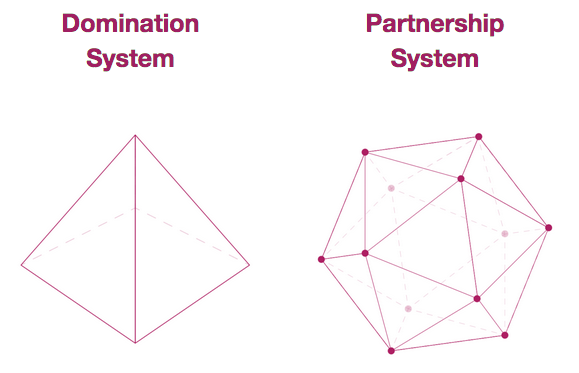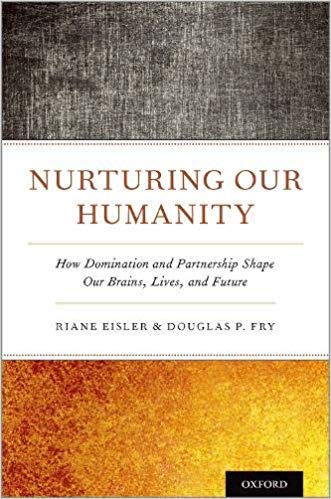Partnership Systems
The Partnership System provides solutions for our personal, social, economic, and ecological challenges. It is a? framework for organizing every aspect of society around life-supporting values of mutual respect and mutual responsibility, non-violence, equality, empowerment, and caring.
Riane Eisler?s research shows that partnership systems and domination systems are opposite ends of a spectrum of cultural possibilities for shaping our relations with ourselves, one another, and nature.
The Partnerism movement is a CPS initiative to make Partnership Systems mainstream, starting with shifting to a caring economics of Partnerism: a socio-economic system that values and rewards caring for one another, nature, and our collective future. We invite you to join the movement!
How do partnership systems and domination systems differ?
The degree to which a society or group adheres more to a partnership system or a domination system goes beyond Right-Left, Eastern-Western, capitalist-socialist, religious-secular, developed-developing, and other familiar categories. These contrasting social systems are different in many ways, but they have four key, interactive components:
- Family and Social Structure
- Gender Roles and Relations
- Fear, Abuse and Violence
- Narratives

Domination System
Partnership System
1. Family & Social Structure
Authoritarian structure and hierarchies of domination in family and society. Top-down control of economic resources. Children observe and experience inequality and inequity as the norm.
Democratic structure and hierarchies of actualization. Caring is economically valued. Egalitarian and equitable adult relations are the norm. Parenting is not authoritarian but authoritative.
2. Gender Roles & Relations
Ranking of male half of humanity over female half. Rigid gender stereotypes, with ?masculine? traits and activities such as toughness and conquest ranked over ?feminine? ones such as care giving and nonviolence.
Equal valuing of the male and female halves of humanity, fluid gender roles with a high valuing of empathy, caring, caregiving, and nonviolence in women and men, as well as in social and economic policy.
3. Fear, Abuse & Violence
High degree of fear and violence, from child- and wife-beating to abuse by ?superiors? in families, workplaces, and society.
Low degree of fear, abuse, and violence, as they are not needed to maintain top-down rankings. Respect for diversity and human rights.
4. Narratives
Beliefs and stories justify and idealize domination and violence, which are deemed inevitable, moral, and desirable.
Beliefs and stories present empathic, mutually beneficial, nonviolent relations as normal, moral, and desirable.
Five Key Guidelines
- The partnership/domination lens helps us see where to focus our energies to build better lives and a for a better world.
- No society is a pure partnership system or domination system.
The core configuration of the domination system is starkly visible cross-culturally and historically in brutally repressive and violent societies ? whether secular, like rightist Nazi Germany in the West or Kim Jong Un?s leftist North Korea in the East, religious, like ISIS in the Middle East or Boko Haram in Africa. More equitable and peaceful societies ? whether ancient such as much of our deep nomadic forager past and ?atalh?y?k and other prehistoric cultures, or modern such as Sweden, Norway, and Finland ? adhere more? to the partnership system?s core configuration. - Our brains are shaped by partnership- or domination-oriented environments.
Findings from psychology and neuroscience show that the degree of partnership or domination in our foundational human relations — between women and men, and between parents and children — directly affects how our brains develop. - Partnership- or domination-oriented families are a template for politics, economics, and other social institutions.
Our experiences as children with either partnership or domination relations impact our whole society. They shape what we believe is ?natural? in all spheres, from family and education to politics and economics. These connections explain why a top priority of regressive leaders (whether secular or religious, Eastern or Western) is pushing women into subservient roles in rigidly male-dominated, highly punitive ?traditional? families. In these families, children learn it is painful to question orders, no matter how unjust, and that abuse and violence by those in power are normal and moral. - Domination systems are not inevitable.
For millennia in our prehistory partnership systems were primary, and for much of modern history social movements have challenged traditions of domination, — from the rule of kings over ?subjects,? to men over women, to a ?superior? race or religion over ?inferior? ones, to the once hallowed ?conquest of nature.? However, the movement toward partnership has been countered by fierce resistance, and we are today in a time of regression to the domination end of the social scale. The chart that follows shows four cornerstones of social systems we must change to four core components of partnership and domination systems highlight the actions needed to change our direction and continue the movement from domination to The Partnership System in all aspects of our lives.
??????? The Politics of Partnership: The Four Cornerstones
Agenda
Domination System
Partnership System
1. Childhood
Promote fear-based parenting to teach unquestioning obedience. Present ?spare the rod and spoil the child? as necessary and moral. Condition people to emotionally depend on those on top, rather than develop their own powers of thinking and creating.
Oppose funding for good nutrition, universal healthcare, and other measures that protect children and help them develop their potentials.
Dismantle public education and re-impose rote teaching-to-the-test to rank and humiliate children, teachers, and schools. Squeeze out education that teaches gender-balance, multiculturalism, peace, and environmental sensitivity.
Give little or no economic value to the ?women?s work? of care giving in families. Oppose support for childcare, paid parental leave, and other caring policies.
Delegitimize violence against children as dysfunctional and immoral. Campaign to end violence and abuse of children. Promote partnership (non-violent, authoritative rather than authoritarian) parenting that empowers rather than disempowers children.
Ensure good nutrition and healthcare for all children. Show the personal, economic, environmental, and social benefits of this.
Support and improve public education. Promote multicultural, gender-balanced, and environmental education to help young people learn to respect themselves, others, and the environment and co-create a healthy future.
Demand high quality childcare and caregiver training. Award high status and economic benefits to the essential work of care giving, whether done by women or men, in families or the marketplace.
2. Gender
Reinforce cultural beliefs that women must be controlled by male heads of families and policy makers. Reinforce the masculinity -domination link and the femininity-subservience link. Oppose funding for programs that offer protection from violence to girls and women and the LGBTQ community.
Reinforce social priorities that value activities stereotypically associated with men over those associated with women. Denigrate men who are nonviolent and caring as ?sissies? or ?wimps.?
Reinstate curricula that focus on the male half of humanity, reinforcing mindsets that one kind of person or group is more valuable than another.
Fill policy-making positions with men (and token women) who support those who have economic control and want to take away rights to family planning and reproductive choice.
Change cultural beliefs that men are entitled to control women in families and societies. Unlink masculinity from domination and violence, and femininity from subordination and obedience. Unite to stop violence against girls and women and to protect the LGBTQ community.
Change social priorities so activities stereotypically associated with women are valued highly. Teach that caring and nonviolence are essential in men, women, and social policy for a more peaceful and just world.
Enact gender-balanced education. Support partnership education as foundational to end sexism, racism, anti-Semitism and other dominator ?isms.?
Elect women leaders and bring partnership-oriented women and men from diverse racial and ethnic groups into decision-making to support caring and empathic policies, including family planning and reproductive choice.
3. Economics
Pass on costs of environmental and health damage to consumers, taxpayers, and future generations. Oppose socially and ecologically responsible business standards under the guise of ?free markets? and ?globalization.? Develop organizations, rules, and policies that lack empathy, such as agencies that cut back social services and maintain top-down economic control.
Oppose meaningful political campaign financing reform to maintain control of laws and social and economic policies by powerful economic interests.
Maintain the devaluation of the ?women?s work? of care giving, and oppose caring policies.
Oppose changes in measures of economic productivity that protect socially and environmentally irresponsible practices.
Perpetuate old economic theories such as capitalism and socialism that came out of early industrial times. Ignore the realities of our post-industrial age when jobs are increasingly replaced by automation, robotics, and artificial intelligence.
Enact environmentally and socially responsible business standards and rules. Work for Partnership Charters for domestic and international corporations as well as in economic and environmental treaties. Reward pro-social policies and practices with tax breaks and other benefits and penalize irresponsible ones.
Enact public campaign financing and other means of ending economic control of politics, freeing policy makers to work for an equitable, environmentally sustainable, and caring economic system.
Show the economic value of caring for people and nature, and ensure it is adequately rewarded.
Use new measures of economic productivity (Social Wealth Economic Indicators) that focus on quality-of-life, human development, and environmental sustainability.
Form coalitions to support a caring economics or partnerism to meet the unprecedented technological, economic, and environmental challenges of our time of technological, social, economic, and environmental challenges.
4. Narratives/Language
Reinforce fragmented thinking through old categories such as religious vs. secular, Eastern vs. Western, and so forth.
Preserve cultural beliefs that human nature is selfish and violent, and hence that people must be rigidly controlled through fear and force. Discredit partnership -oriented beliefs, attitudes, and narratives as ?fantasy,? and present self-interest and concern for others as opposites rather than as interconnected.
Use media monopolies and social media to negate partnership possibilities.
Use schools and media to make rankings of domination seem normal, natural, and divinely ordained.
Reinforce the belief that ranking male over female is divinely or naturally ordained, as well as gender stereotypes requiring men not to be like ?inferior? women and never to embrace ?soft? or ?feminine? traits and activities like caring, care giving, and nonviolence.
Promote, often under the guise of religion, a ?morality? of fear, scarcity, intolerance of the ?other,? violence, punishment, and the necessity for strongman saviors.
Use and spread the social categories of partnership systems and domination systems, plus narratives that promote partnership.
Discredit narratives that promote domination. Strengthen the understanding that human nature is flexible and includes a powerful capacity for empathy, caring, and creativity. Show that self-interest and concern for others are not opposites but mutually supporting.
Ensure that the voice of partnership is heard, and counter false stories in social media.
Offer schools and media tools to recognize beliefs, myths, and stories that promote domination or partnership. Help them understand the consequences of each.
Create and disseminate narratives that support men and women worldwide in regaining their full spectrum of positive human capacities and possibilities. Recognize the value of caring, care giving, and nonviolence in both women and men.
Promote partnership morals and principles. Nurture the spiritual courage required to make partnership a way of life.
Resources
 Read the new book!
Read the new book!
Nurturing Our Humanity: How Domination and Partnership Shape Our Brains, Lives, and Future by Riane Eisler and Douglas Fry, (New York: Oxford University Press, 2019).
Articles:
The Politics Of Partnership: Four Cornerstones
Myths of Partnership
The Language of Partnership
Other Resources
A list of partnership books and articles can be found in the bookstore and the online library:
Articles, Interviews & Speeches

